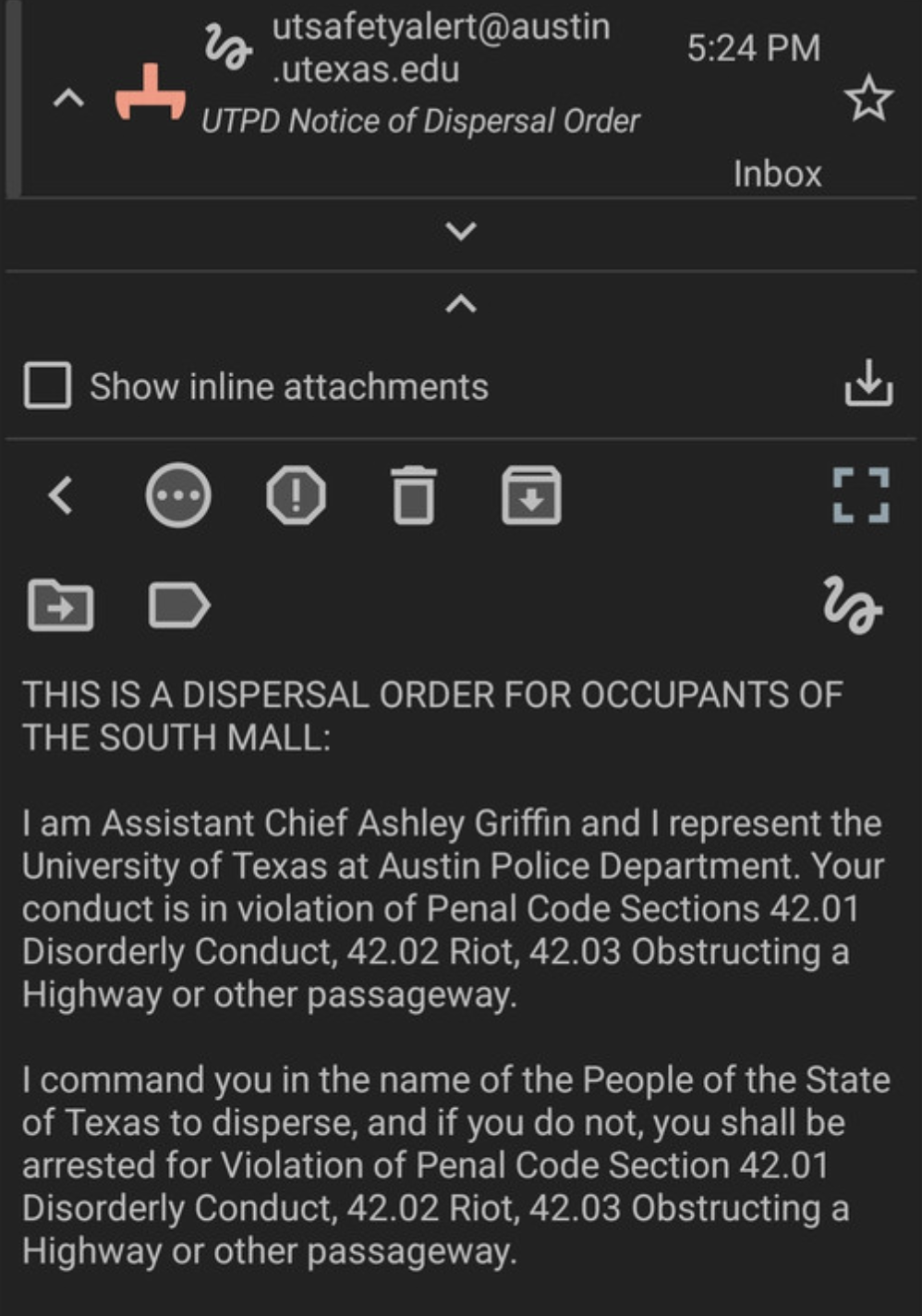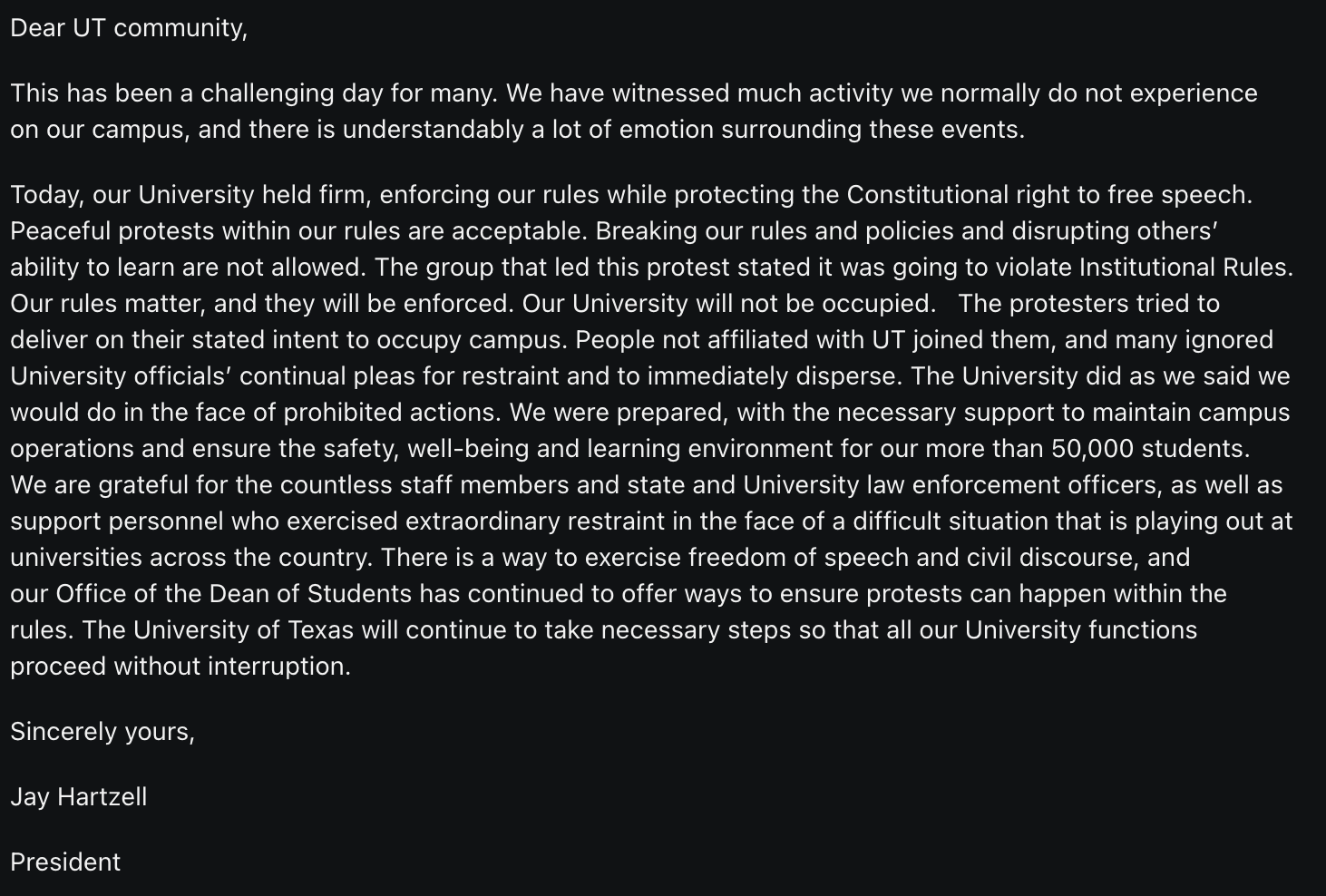Yesterday, nearly 60 protesters at the University of Texas at Austin. Most were charged with criminal trespass, a Class B misdemeanor in Texas. The arrests occurred during a pro-Palestinian demonstration where students were demanding the university divest from companies supplying weapons to Israel for its strikes on Gaza.
The Right to Protest in Texas
The right to protest in the United States is protected under the First Amendment of the U.S. Constitution, which states that “Congress shall make no law … abridging the freedom of speech or the press; or the right of the people peaceably to assemble, and to petition the Government for a redress of grievances.” This fundamental right ensures that individuals are free to express their opinions publicly and engage in peaceful protests without undue interference from the government.
Similarly, the Texas Constitution also safeguards the right to protest. Article I, sections 8 and 27 protect the “liberty to speak, write or publish … opinions on any subject” and “the right … to assemble.”
Freedom of Speech and Assembly Are Not Unlimited Rights
While the right to protest is protected under both the U.S. Constitution and the Texas Constitution, the government can impose certain limitations. These limitations generally relate to maintaining peace and public order and can regulate how, when, and where protests occur.
Time, Place, and Manner Restrictions
The government may impose time, place, and manner restrictions on protests, and these must be content-neutral restrictions that do not regard the content of the expression. Restrictions are considered content-neutral if they are not based on the content or viewpoint of the expression. The restrictions must be designed to address the needs of public order and safety without targeting the message being conveyed.
The University of Texas has created its own time, place, and manner restrictions here.
When are time, place, and manner restrictions permissible?
Here are the key conditions under which such restrictions are permissible:
- Narrowly Tailored: The restrictions must be narrowly tailored to serve a significant government interest. This means they should not be broader than necessary to achieve the government’s legitimate objectives.
- Significant Government Interest: The restrictions must advance a significant government interest, such as traffic control, public safety, or the prevention of disorder. This interest must be substantial and not a pretext for suppressing the expression itself.
- Content-Neutral: The restrictions must be unrelated to the content of the speech. They cannot be used to favor or disfavor any viewpoint or subject matter. For example, the government cannot impose a restriction that only applies to political protests but not to other types of gatherings.
- Ample Alternative Channels: The restrictions must leave open ample alternative channels for communication. Protesters must have adequate alternative means to convey their message, even if it is not their preferred or most effective method.
- Not Based on Viewpoint: The government cannot regulate or restrict speech based on its viewpoint. Even if the views expressed are unpopular or controversial, they are still protected under the First Amendment.
- Applied Equitably: The restrictions must be applied equitably to all groups, without discrimination. For instance, the government cannot allow one group to protest in a public space while denying another group the same opportunity based on the content of their message.
- Avoiding a Heckler’s Veto: The government cannot deny a permit or impose restrictions based on the anticipated reaction or hostility of counter-protesters. This is known as a “heckler’s veto” and is generally considered an invalid reason for restricting speech.
These principles ensure that while the government can regulate the logistics of protests to maintain public order, it cannot do so in a way that suppresses free expression based on its content. The restrictions must be justified without reference to the content of the regulated speech and must be the least restrictive means necessary to further the government’s content-neutral interests.
Free Speech Zones
Some colleges have attempted to restrict protests to designated “free speech zones,” but the law often supports the right of students to protest in open, public areas of campus. In 2019, Texas passed a free speech law that established all common outdoor areas at public universities as traditional public forums, allowing anyone to exercise free speech there, as long as their activities are lawful and do not disrupt the normal functions of the university. This law effectively prohibits public universities in Texas from confining free speech to small, designated zones.
Unprotected Speech
Certain types of speech, such as true threats, incitement to imminent violence, and unlawful conduct like civil disobedience, are not protected.
Intervention in Discriminatory Harassment
While free speech protections are broad, colleges may need to intervene when speech crosses into federal anti-discrimination law violations.
What charges could stem from a demonstration or protest?
Texas authorities can use various laws to break up a peaceful demonstration if certain conditions are met. These include:
Anti-Riot Law
Texas has specific laws that define and address rioting, primarily codified in the Texas Penal Code Section 42.02. According to this statute, a “riot” is defined as the assembly of seven or more persons resulting in conduct that either creates an immediate danger of damage to property or injury to persons, substantially obstructs law enforcement or other governmental functions or services, or by force, threat of force, or physical action deprives any person of a legal right or disturbs any person in the enjoyment of a legal right. Participation in a riot is considered a criminal offense.
Criminal Trespass
Even though a university is a public institution, the property is still owned by the university, which can set rules for its use. If a protest is held in an area not designated for public assembly or after being asked to leave, participants may be charged with criminal trespass. Texas law deems all outdoor common spaces a public forum, subject to any time, place, and manner restrictions adopted by the institution.
Obstruction of a Highway
A person commits an offense if they, without legal privilege or authority, intentionally, knowingly, or recklessly:
Obstruct a highway, street, sidewalk, railway, waterway, elevator, aisle, hallway, entrance, or exit to which the public or a substantial group of the public has access or any other place used for the passage of persons, vehicles, or conveyances.
Disobeying Orders to Move
The offense also includes disobeying a reasonable request or order to move issued by a person known to be or identified as a peace officer, a firefighter, or a person with authority to control the use of the premises.
Disorderly Conduct
Disorderly conduct in Texas can include making an offensive gesture or display in public that tends to incite an immediate breach of the peace or making unreasonable noise in a public place. Under these circumstances, Disorderly conduct is a Class C misdemeanor. It is punishable by up to a 500 fine and no jail time. However, a person can be arrested for this Class C misdemeanor to bring the charge against them.
It’s important to note that while these laws exist, the application must be consistent with the First Amendment rights to free speech and assembly. The use of these laws to break up a peaceful protest should be a last resort and done in a way that minimally infringes on these constitutional rights.
Order to Disperse Required
Texas Penal Code 42.04 states that if an offense primarily involves speech, gathering to hear speech, or nonviolent expression — specifically offenses listed under Section 42.01(a)(5) for making unreasonable noise, Section 42.03 for obstructing a passageway, or Section 42.055 for disrupting funeral services — the law mandates a particular procedure to be followed before an individual can be arrested.
This order must be issued before any arrest can be made. It may be issued by peace officers (like police), firefighters, authority figures in control of the premises (like a building manager), or persons directly affected by the violation (like someone whose funeral service is being disrupted).
Further, a defense can be claimed if:
- No Order Given: The person can argue that they were not given any order to remedy the violation, which is required before an arrest.
- Unreasonable Order: The order given was unreasonable in scope, making it impractical or unfair to comply.
- Order Obeyed: The individual promptly obeyed the order when given.
This is at least one order the University of Texas sent out:
What happened with the arrestees?
The Travis County Attorney’s office decided to drop charges against 46 protesters due to deficiencies in the probable cause affidavits provided by law enforcement.



